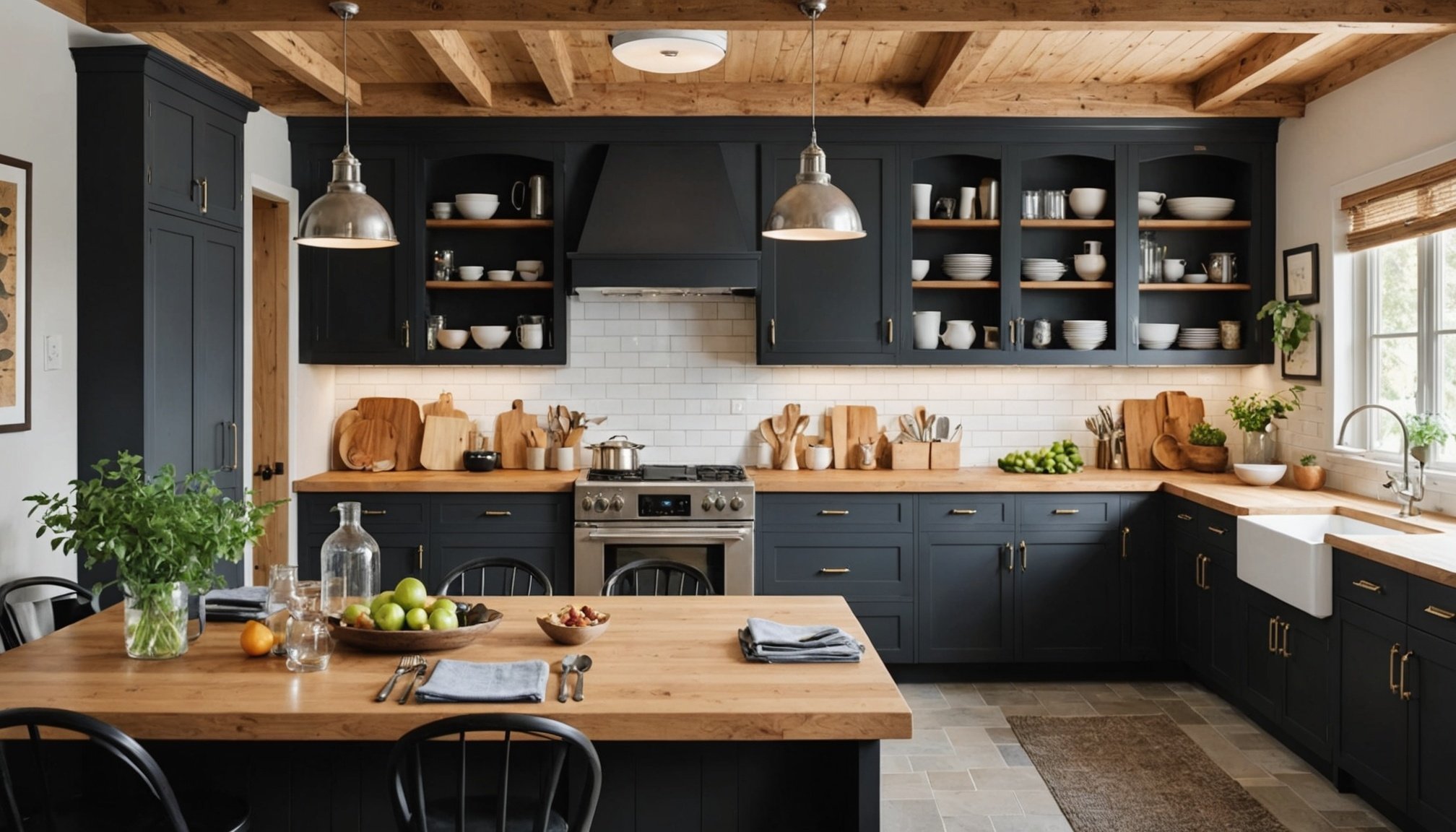Understanding Zero-Waste Kitchen Principles
Adopting zero-waste principles in your kitchen is essential for creating a sustainable living environment. These principles focus on managing resources efficiently and minimizing waste production. The goal is to achieve a kitchen design that harmonizes with eco-friendly living by employing strategies that emphasize sustainable kitchen design.
Key concepts of a zero-waste kitchen include the four vital steps: reduce, reuse, recycle, and compost. Reduce the amount of waste by purchasing only what you need and avoiding excess packaging. Opt for bulk buying when possible, as it minimizes individual packaging waste. Reuse containers and materials, like glass jars and cloth bags, to sustain your kitchen’s eco-friendly living practices. Recycle items diligently by sorting materials, ensuring they are properly cleaned and suitable for the recycling process. Finally, compost organic waste such as fruit peelings and coffee grounds, turning these into valuable nutrient-rich soil for gardening.
In parallel : Creating the ultimate indoor-outdoor kitchen blend for unforgettable entertaining experiences
By embracing these zero-waste concepts, individuals can significantly reduce their environmental footprint. This leads to not only a more sustainable kitchen design but also contributes positively to the overall ecology, ensuring greener living for future generations.
Innovative Sustainable Design Layouts
Incorporating sustainable design in kitchens can revolutionize how we use and experience these spaces. Among the trending approaches are open concept kitchens which not only boost social interaction but also promote eco-friendly spaces. Open layouts enhance natural light penetration, reducing energy consumption. For sustainability, materials like recycled glass countertops and bamboo flooring are excellent choices. These options help lower environmental impact without compromising on style.
In the same genre : Transform your humid bathroom: a comprehensive guide to installing vertical moss walls
Open Concept Kitchens
Modular Kitchen Systems
Moving towards modular kitchen systems offers significant advantages like adaptability and reduced waste. These systems are flexible and can easily be reconfigured to accommodate changing needs or tastes, thus lengthening the lifespan of the kitchen setup. Key sustainable materials often used include certified wood and low-VOC finishes, which further aids in crafting an eco-friendly space.
Vertical Gardens and Edible Landscaping
Adding vertical gardens or edible landscaping within kitchen layouts not only offers a fresh aesthetic appeal but also provides a means for sustainable food production. These green elements can be integrated via green walls or herb planters, transforming the kitchen into a lively, productive environment. They contribute to a more self-sustaining lifestyle by allowing occupants to grow their own herbs and vegetables.
Eco-Friendly Materials for Kitchen Renovation
In kitchen renovation today, sustainable materials are a top priority for many homeowners seeking to reduce their environmental footprint. Popular eco-friendly options include bamboo, recycled metals, and reclaimed wood, each offering unique benefits.
Bamboo is known for its rapid growth and ability to regenerate after harvesting, making it a renewable resource. This versatility allows it to be used for cabinetry, flooring, and even countertops. Additionally, bamboo boasts a stylish, modern aesthetic while ensuring durability.
Recycled metals, such as aluminium and steel, provide a sleek, industrial look and are often incorporated into fixtures, backsplashes, and hardware. The use of recycled elements helps conserve resources and reduces landfill waste.
Reclaimed wood showcases character and history, contributing warmth and texture to kitchen spaces. It’s an ideal choice for cabinetry and flooring, offering both environmental and stylistic advantages. By reusing existing materials, it also helps reduce deforestation.
When selecting eco-friendly countertop and flooring options, consider long-lasting materials like recycled glass or sustainable concrete. These choices not only contribute to a greener planet but also enhance the direct aesthetic appeal and functionality of your kitchen renovation.
Choosing Eco-Friendly Appliances
In today’s world, the significance of selecting energy-efficient appliances cannot be overstated, particularly within the context of creating an eco-friendly kitchen. By opting for appliances that maximize efficiency, consumers not only contribute to a sustainable planet but also enjoy reduced utility bills and enhanced performance.
One pivotal consideration when choosing these appliances is the presence of certifications, such as the Energy Star label. This designation indicates that a product meets stringent energy efficiency standards, consuming less power and reducing greenhouse gas emissions. It’s a reliable guide for those looking to invest in sustainable technology.
When considering eco-friendly options, think about refrigerators, dishwashers, and ovens designed for minimal energy consumption and optimal operation. These appliances often include features such as smart sensors and energy-saving modes, which further reduce their environmental impact.
- Refrigerators: Choose models with efficient cooling systems that maintain consistent temperatures and reduce energy usage.
- Dishwashers: Opt for those with eco-settings that use less water and energy.
- Ovens: Look for convection ovens which cook food faster and more evenly, reducing operation time.
By equipping your kitchen with these eco-friendly appliances, you’ll be making a responsible choice that benefits both your household and the environment.
Practical Zero-Waste Tips for Daily Use
Adopting zero-waste tips can significantly contribute to more sustainable living, especially in the kitchen. Here, we delve into practical steps you can take to reduce waste and foster a more eco-friendly environment.
Composting Systems
Setting up a simple composting system in your kitchen can significantly reduce organic waste. You can choose between various composting systems, such as a countertop bin or a worm composter. Composting not only minimises waste but also enriches soil, promoting healthier plant growth and aligning with sustainable living ideals.
Bulk Buying and Minimal Packaging
Opting for bulk buying is an effective strategy for reducing kitchen waste. Purchase dry goods like rice, pasta, and legumes in large quantities to minimise packaging waste. Visit local markets that encourage buyers to bring reusable containers. Choosing items with minimal packaging supports sustainable living, reducing container waste that contributes to landfill overflow.
Upcycling Kitchen Items
Explore creative ways to upcycle common kitchen items. Turn old jars into storage containers or use worn-out utensils as plant markers. Upcycling not only prevents these items from ending up in the bin but also fosters a culture of sustainability by showcasing innovative reuse methods in your daily routines.
Sourcing Sustainable Products and Local Resources
Finding sustainable products for your kitchen can make a significant difference not just for the environment, but also for your local economy. Start by seeking out items crafted from renewable materials or products certified for their environmentally friendly methods. Consider kitchen utensils made from bamboo or recycled stainless steel.
Supporting local businesses is pivotal when planning eco-friendly renovations. Local sourcing not only reduces the carbon footprint involved in transporting materials but also boosts the local economy. Many local artisans offer unique, sustainable goods that add charm and character to your kitchen space. Procuring goods locally also allows you to inquire directly about the sourcing and production methods, enhancing your understanding of the product’s sustainability.
Online resources are abundant for those researching sustainable kitchens. Directories like the Eco Products Directory or Green Marketplace offer comprehensive listings of suppliers providing eco-friendly solutions. Additionally, platforms such as Etsy can help locate artisans offering handmade, sustainable pieces. These resources simplify the process of aligning your kitchen transformation with eco-friendly practices by providing focused, easily accessible options. Remember, each small decision contributes to a more sustainable home and lifestyle, reinforcing the positive impact on the environment.











